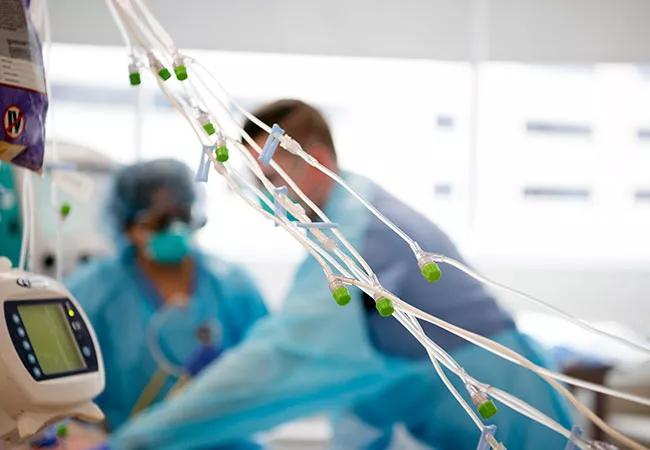Questions around the role of mechanical circulatory support loom large

The dramatic reductions in mortality from acute myocardial infarction (AMI) seen in recent decades have not extended to AMI complicated by cardiogenic shock (AMICS), for which mortality continues to hover around 40% despite the use of primary angioplasty.
Advertisement
Cleveland Clinic is a non-profit academic medical center. Advertising on our site helps support our mission. We do not endorse non-Cleveland Clinic products or services. Policy
“The management of shock in this setting remains a major challenge,” says Venu Menon, MD, Director of Cleveland Clinic’s Cardiac Intensive Care Unit and Section Head of Clinical Cardiology.
While mechanical circulatory support (MCS) devices are increasingly used in this patient population, their use has varied and evidence of a mortality benefit in randomized trials has been lacking. This prompted the American Heart Association (AHA) to assemble a team of experts to review the evidence and develop a scientific statement (published online in Circulation) delineating best practices for the invasive treatment of AMICS.
“Now that we have devices that provide temporary hemodynamic support to both the right and left sides of the heart, we want to encourage their use,” says Dr. Menon, who co-authored the new AHA statement. “However, enthusiasm must be tempered by the absence of randomized controlled trials showing a mortality benefit as well as by the fact that these devices are costly and not free from complications.”
Shock can occur in the setting of acute MI when the myocardium is extensively damaged by a single large MI or by multiple MIs occurring over time.
“By saving people after their first or second MI, we have paradoxically created a more vulnerable population that has significant preexisting damage to the myocardium,” Dr. Menon explains. “The slight increase in the incidence of AMI complicated by cardiogenic shock is a testament to our success in keeping patients alive.”
Advertisement
Shock can also occur when a patient presents so late that the heart is extensively and irreparably damaged. In early 2020, when hospital systems became overwhelmed with COVID-19 patients, some systems were unable to triage MIs appropriately. In other cases, patients with MI simply stayed away.
“Initially, it appeared the number of MIs nationwide had decreased, but there was no real biological reason for this,” says Dr. Menon. “It turned out that many patients were simply afraid to go to the hospital. This delayed the time from infarct onset to treatment, which increased the rate of presenting shock and mechanical complications in 2020.”
Dr. Menon says that as he and his co-authors reviewed current practices in the management of AMICS nationwide, one thing became clear: AMICS should be avoided at all costs. He notes three key points about AMICS and its management:
Advertisement
Cleveland Clinic chose to face the challenge posed by AMICS patients by creating a shock team comprising a cardiac intensive care physician, a cardiothoracic surgeon/heart failure specialist and a heart failure/transplant cardiologist. A single page can activate and provide immediate access to this multidisciplinary, patient-centered team on a 24/7/365 basis. Regional providers can access this shock team by calling 216.448.7000.
“When we receive a call, we immediately determine whether it’s safe for the patient to make the transfer, what kind of support we will provide, who should meet the patient, what we will do first, which side of the heart to support and whether the patient is a candidate for transplantation,” says Dr. Menon. “We make these decisions before the patient even leaves the transferring facility.”
Now that current practices in AMICS care have been put on paper, the unanswered questions are evident, Dr. Menon says. “The most critical question, given what we know now, is whether temporary MCS devices impact outcomes,” he notes. “We need higher-quality evidence.”
Other key issues, he adds, are which device to use in which situation, and how early it should be implanted. “Should we wait for signs of end-organ hypoperfusion?” he asks. “It seems like a no-brainer to put a device into every patient before something happens, but it’s not that straightforward. These devices come with risks and challenges of their own, not to mention their expense.”
He hopes answers to these questions will lead to appropriate use of MCS devices and better outcomes for patients with AMICS. “These devices provide a unique opportunity to move the needle in this vulnerable population,” he says.
Advertisement
“Tremendous advancements have been made in the capability and design of temporary MCS devices over the last few years,” notes Edward Soltesz, MD, MPH, Surgical Director of Cleveland Clinic’s Kaufman Center for Heart Failure Treatment and Recovery. “Surgically implanted devices, particularly the transvalvular axial flow pumps, provide longer and more stable support with adequate flow and left ventricular unloading, with the potential to facilitate recovery or bridge to the next therapy.
“However, given that the indications and type of support vary with every patient,” continues Dr. Soltesz, “the use of such devices should be directed by an experienced team, like the Cleveland Clinic shock team, that is capable of defining the correct candidate and destination alternatives — and that also has the experience to identify futile support. Randomized trials are certainly needed in this setting, but they can be challenging to perform logistically and ethically.”
Advertisement
Advertisement

How Cleveland Clinic is using and testing TMVR systems and approaches

NIH-funded comparative trial will complete enrollment soon

How Cleveland Clinic is helping shape the evolution of M-TEER for secondary and primary MR

Optimal management requires an experienced center

Safety and efficacy are comparable to open repair across 2,600+ cases at Cleveland Clinic

Why and how Cleveland Clinic achieves repair in 99% of patients

Multimodal evaluations reveal more anatomic details to inform treatment

Insights on ex vivo lung perfusion, dual-organ transplant, cardiac comorbidities and more